| NUPTIAL
BEDROOM WITH ULYSSES’ S RETURN You are led to this room, which
was the nuptial bedroom of the earl Francesco Milzetti and his wife Giacinta Marchetti,
from the Companion room: these two rooms are a little
self-sufficient flat.
The iconographical theme is linked to the room: in fact the freschi describe
Ulysses’s return to Ithaca and on the middle of the
ceiling the scene of the uniting of Ulysses and Penelope is represented: they are
walking on roses’ petals together with Minerva, Eros and a maid keeping a torch; in
the backdrop, other servants are making the bed.
The walls are covered with material and the freschi are of green, light blue and red.
Around the scene on the ceiling are represented:
- The return of Telemachus;
- Ulysses being recognised by his dog Argo;
- Ulysses and Telemachus hiding their weapons;
- Penelope listening to Ulysses who is dressed as a beggar;
- The recognition of Ulysses by Euriclea;
- Ulysses fighting and beating Procis;
- Euriclea telling Penelope about the return of Ulysses;
- Ulysses resting after the battle.
The two pictures represented in raised plaster are of:
- Minerva asking Iuppiter about the destiny of Ithaca;
- Minerva brings Ulysses towards peace.
The floor, as in many other rooms, has been restored.
In this room the ornamentation is a uniting of traditional classical motives and ceramic
decorations: the raffaellesques are lighter and calligraphic; frames and mouldings ,
coloured of green, red and blue, are finely drawn with motives that we can find in
majolica.
This room, with the War and Peace one, will become a model
for the ornamentation of houses in Faenza until the first years of 1900: the ornamentation
will be more and more composite, having then a preference for simpler handicraft forms, as
the lace.
(in italiano)
|
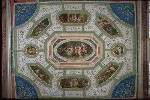
The ceiling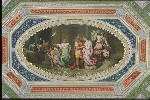
Uniting of Ulysses and Penelope
(middle of the ceiling)
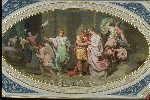
Uniting of Ulysses and Penelope
(middle of the ceiling)
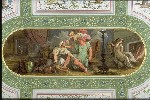
Ulysses being recognised by Euriclea
|
THE MYTH OF ULYSSES’S RETURN TO
ITHACA
After a trip of twenty years, Ulysses comes back to Ithaca.
Penelope waits for him at home, while the Procis live in his palace and want Penelope to
marry one of them: She had promised them to give an answer as she would have finished to
weave Laerte’s sheet: everyday she used to work at it, but during the night she would
undo it.
Ulysses goes to Eumeo’s, the swineherds head, and he is recognised by him and
Telemachus; dressed as a beggar, he goes to the palace, where nobody recognise him, but
his dog Argo and his wet-nurse Euriclea.
Telemachus hides all the weapons of the palace in a room, while Ulysses meets Penelope,
who doesn’t recognise him; she has finally decided to get marry to the man who can
draw Ulysses’s bow: nobody but Ulysses does it, and so the murdering of the Procis
begins.
When Ulysses reveals himself to Penelope, he describes her their nuptial bedroom, which is
known only by them, to make her doubt be cancelled.
|
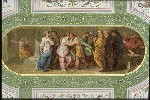
The return of Telemachus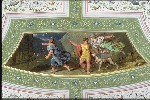
Ulysses being recognised by Argo
|
ALFRED TENNYSON (1809-1892):
ULYSSES (from "Poems", 1842)
- It little profits that an idle king
- By this still hearth, among these barren crags,
- Matched with an aged wife, I mete and dole
- Unequal laws unto a savage race,
- That hoard, and sleep, and feed, and know not me.
- I cannot rest from travel: I will drink
- Life to the lees: all time I have enjoyed
- Greatly, have suffered greatly, both with those
- That loved me, and alone; on shore, and when
- Trough scudding drifts the rainy Hyades
- Vexed the dim sea: I am become a name;
- For always roaming with a hungry heart
- Much have I seen and known; cities of men
- And manners, climates, councils, governments,
- Myself not least, but honoured of them all;
- And drunk delight of battle with my peers,
- Far on the ringing plains of windy Troy.
- I am part of all that I have met;
- Yet all experience is an arch wherethrough
- Gleams that untravelled world, whose margins fades
- For ever and for ever when I move.
- How dull it is to pause, to make an end,
- To rust unburnished, not to shine in use!
- As though to breathe were life. Life piled on life
- Were all too little, and of one to me
- Little remains: but every hour is saved
- From that eternal silence, something more,
- A bringer of new things: and vile it were
- For some three suns to store and hoard myself,
- And this gray spirit yearning in desire
- To follow knowledge like a sinking star,
- Beyond the utmost bound of human thought.
- This is my son, mine own Telemachus,
- To whom I leave the sceptre and the isle-
- Well-loved of me, discerning to fulfil
- This labour, by slow prudence to make mild
- A rugged people, and trough soft degrees
- Subdue them to the useful and the good.
- Most blameless is he, centred in the sphere
- Of common duties, decent not to fail
- In offices of tenderness, and pay
- Meet adoration to my households gods,
- When I am gone. He works his work, I mine.
- There lies the port: the vessel puffs her sail:
- There gloom the dark broad seas. My mariners,
- Souls that have toiled, and wrought, and thought with me –
- That ever with a frolic welcome took
- The thunder and the sunshine, and opposed
- Free hearts, free foreheads – you and I are old;
- Old age hath yet his honours and his toil;
- Death closes all: but something ere the end,
- Some work of noble note, may yet be done,
- Not unbecoming men that strove with Gods.
- The lights begin to twinkle from the rocks:
- The long day wanes the slow moon climbs: the deep
- Moans round with many voices. Come, my friends,
- ‘Tis not too late to seek a newer world.
- Push off, and sitting well in order smite
- The sounding furrows; for my purpose holds
- To sail beyond the sunset, and the baths
- Of all the western stars, until I die.
- It may be that the gulfs will wash us down:
- It may be we shall touch the Happy Isles,
- And see the great Achilles, whom we knew.
- Though much is taken, much abides; and though
- We are not to now that strength which in old days
- Moved earth and heaven; that which we are, we are;
- One equal temper of heroic hearts,
- Made weak by time and fate, but strong in will
- To strive, to seek, to find; and not to yield.
|
|
| Analysis This
poem consists in four stanzas of several lengths; the verses are jambic pentameters and
there is no rhyme pattern. Every stanza deals with an argument of Ulysses’s
monologue:
I stanza) Ulysses complains his present condition, which consists in a boring life,
"an aged wife, unequal laws and savage race" (lines 3-4);
II stanza) he regrets his past life and all the places he has visited, but he actually
has not satisfied his thirst of knowledge and wants to travel until his death ("how
dull is it to pause, to make an end"-line22; "and this gray spirit yearning in
desire to follow knowledge" lines 30-31);
III stanza) he addresses to his son Telemachus, to whom he leaves his kingdom; although
loves him and believes he will better Ithaca, he criticise him, saying he is conformist
("centred in the sphere of common duties"-lines 30-31);
IV stanza) he addresses to his old crew, which shares with Ulysses the thirst of
knowledge.
Tennyson uses several sound devices to add musicality to the poem: f. i. we find
assonances ("it/little/profits/king"-line1), alliterations
("some/suns/stores"-line 29), repetitions ("that hoard, and sleep, and feed
and know not me"-line 5). All this conveys the idea of unsatisfaction and boredom;
moreover, it reproduces almost realistically the rhythm and fluency of the speech of
Ulysses’s dramatic monologue.
The simile ("like a sinking star"-line31) and the metaphors ("I will drink
life to the lees"-lines 6-7; "with a hungry heart"-line 12; "drunk
delight of battle"-line 16; "to rust unburnished"-line 23) refers to
ordinary experiences of life and war.
In this poem we can recognise as features of a dramatic monologue:
- the use of first person singular;
- references to listeners who do not appear in the poem (the mariners);
- the presence of precise references to places (lines 44-45; 54-56);
- the revelation of Ulysses’s personality just before his death.
The main themes of this poem are:
- the melancholy of approaching death ("death closes all"-line 51; "made
weak by time and fate"-line 69);
- the wish to know and have new experiences;
- the choice of overcoming death through actions.
We might say that Ulysses embodies Tennyson’s feelings and ideals: his life in
Ithaca stands for the Victorian life, that the poet wants to overcome; in addition Ulysses
is described as a romantic hero, who follows his ideals against the conformism of his
contemporary society and, in particular, of his son. Ulysses becomes the expression of the
dynamic man of Tennyson’s times, who believes that he has the right and the duty to
exploit all the possibilities of human intelligence; the hero represents also the poet
alter-ego, giving expression to his torturing doubts about man’s role and destiny
after death.
Tennyson’s Ulysses has much in common with Dante’s, who induced his companions
to leave Ithaca and their families "per seguir virtute e conoscenza", ("to
follow knowledge"-line 31) but unlike Dante’s Ulysses , Tennyson’s is not
going to break a divine law. |
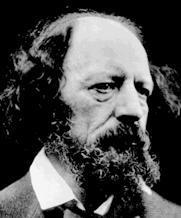
Lord Alfred Tennyson
(1809-1892 |
![]()
![]()
![]()


